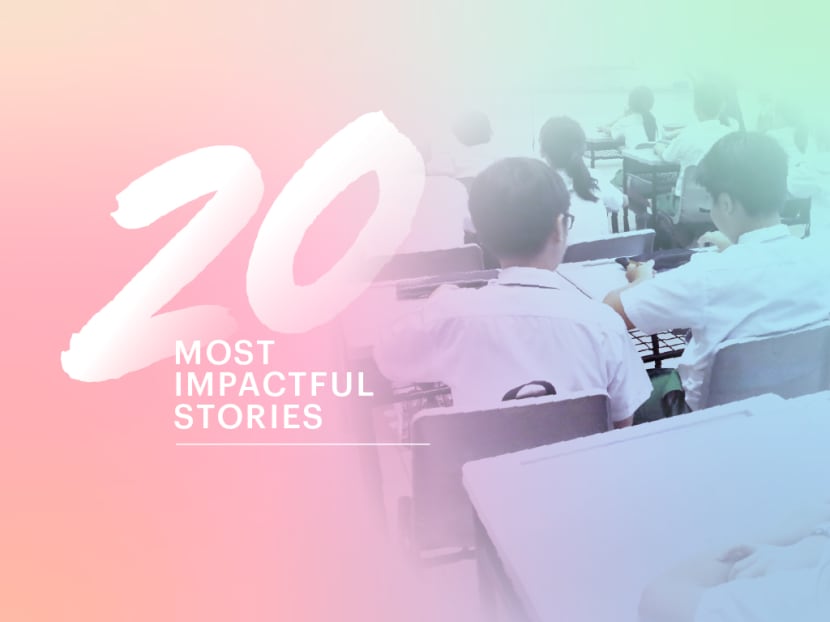TODAY20: What's another word for elitist? (Nov 29, 2005)
Over the past two decades, TODAY has played an active role in public discourse in Singapore. To mark our 20th anniversary in November, we are re-publishing 20 of our most impactful news articles over the years.

In November 2005, a study found that pupils in the Gifted Education Programme had trouble coping and were often ostracised by their peers. TODAY dug deeper into the issue and spoke to students who were undergoing the programme as well as those who had gone through it.
Over the past two decades, TODAY has played an active role in public discourse in Singapore. To mark our 20th anniversary in November, we are re-publishing 20 of our most impactful news articles over the years.
WHAT HAPPENED
- In November 2005, a study found that pupils in the Gifted Education Programme (GEP) had trouble coping and were often ostracised by their peers
- After publishing a report on the study, TODAY dug deeper into the issue and spoke to students who were undergoing the programme, as well as those who had gone through it
- The GEPers, as the participants called themselves, spoke about how they were segregated from other students and formed an elitist clique, to the extent that they had problems relating to the man-in-the-street
WHAT NEXT
- GEP was eventually phased out in secondary schools by 2008, four years after the Integrated Programme (IP) was introduced that allowed academically stronger students to skip the GCE O Levels and take either the A levels or International Baccalaureate diploma in six years
- Today, GEP is implemented in primary schools — students are identified in Primary 3 to join the programme — to develop intellectual depth and higher-level thinking, among other goals
- Over the years, GEP has continued to divide opinions. In 2012, for example, it was discussed in Parliament, with several Members of Parliament wondering if it gave rise to an uneven playing field for students here and questioning the efficacy of assessing students at such a young age for the GEP. In response, the Ministry of Education said it will continually review GEP to ensure its relevance
SINGAPORE — He teaches students from the Gifted Education Programme (GEP) and observes at close hand what many have pointed out: They hang out only with each other. They become so comfortable with other GEPers (as they call themselves) that even outside the classroom, they prefer each other's company.
And on overseas trips and during co-curricular activities (CCAs), the teacher said that these students form a clique.
So, more than 20 years after the programme kicked off in Singapore, the same problem remains. GEP's goals include producing the country's future leaders, but it is struggling to get its gifted students to relate to the man-on-the-street.
The debate was reignited recently after this newspaper reported on a study that showed how GEPers found it difficult to cope with the programme's diverse demands and were often ostracised by their peers.
Since then, dozens of GEPers, their parents and other students have written in, but while they differ on the labels, they agree on one point: Though they go to school with general students, the gifted ones are in a world — and a group — of their own.
Even they do not deny it.
GEP student Gwyneth Teo, 15, wrote: ''Ask yourselves if our so-called elitism is very much different from that of the girl-next-door who has a group of friends who hang out together.
''It's genuine friendship and loyalty that bind us together, not status. Is that a crime?''
Michael Wee, another 15-year-old GEP student, said that the ostracism ''does not affect GEP students in any way. What with existing close ties with other fellow GEP students, no one needs to bother about ostracism from those outside the programme''.
While such friendships help them cope, does this segregation not defeat one of the main purposes of the programme?
Mr Johannis Auri Abdul Aziz, 25, a former GEP student, told TODAY that educators ''have known all along that we have a problem relating to other people''.
''We are given a booklet spelling out just how different we are from other people and how the programme would meet our needs.
''We have our own syllabus and our own after-school enrichment activities. We end up developing our own sub-culture that looks really weird from the outside... it is clear that more formal help is needed,'' Mr Johannis said.
He freely admits that many GEPers can be unskilled in social niceties and often cannot make small talk. ''We have limited knowledge of what is appropriate and inappropriate in certain situations,'' he said.
One problem is that ''gifted'' individuals are often ''non-conformists'' who have difficulties blending in, Dr David Peat said. He is a senior educational psychologist at the Institute of Mental Health.
''Gifted individuals are the ones who scan the environment and decide what is worth doing and what is not. It is unfair to call the GEP elitist. It is just another level of a highly structured hierarchical education system,'' Dr Peat, who was also a consultant to the GEP in 2001, said.
But would they make good leaders?
''It depends on your point of view,'' Dr Peat said. ''I would hope that leaders are able to empathise with people who are different, and that they have strong social skills.''
On its part, the Ministry of Education (MOE) said that it has programmes in place to develop GEP students' specific talents, including that of leadership.
Programme participants are housed in regular schools to allow them to mix with mainstream students. Efforts are made to teach them the right values through civics and moral education lessons, while CCAs are supposed to help them blend and mix with others.
A teacher who did not want to be identified and has observed GEPers for a long time said, however, that the problem is that even during CCAs, they tend to stick with each other. ''There should be room for more porous movement between the GEP and the other streams,'' he said.
MOE, which has been tracking 600 of the 4,000-odd students who have graduated from GEP, said that it is otherwise satisfied with the results. A fifth of the tracked students joined the civil service while another fifth took up medicine. Law, engineering and teaching are their other professions of choice.
''We have evidence that the GEP's objectives are met to a large extent,'' an MOE spokesperson said.
She cited the examples of Dr Tracey Ho, 29, and Dr Wong Ting Hway, 32, as GEP graduates who have helped put Singapore on the world map.
Dr Ho is a former national shooter, President's Scholar and Lee Kuan Yew Scholar who was recently named one of the world's top 35 innovators under the age of 35 by the Massachusetts Institute of Technology. Dr Wong was the first Singaporean contracted to work with the International Committee of the Red Cross in Nepal.
Even so, some still think it would help if other gifted students could share their gifts with their peers more easily.











